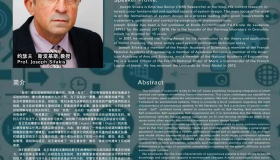【Master Forum】Analytics, Data Science, and Simulation: Opportunities and Challenges
Topic: Analytics, Data Science, and Simulation: Opportunities and Challenges
Speaker: Prof. Peter W. Glynn
Date: Friday, October 26
Time: 15:00-16:15
Venue: Governing Board Meeting Room, Dao Yuan Building
Language: English
Biography of the speaker:
Peter W. Glynn is the Thomas Ford Professor in the Department of Management Science and Engineering (MS&E) at Stanford University, and also holds a courtesy appointment in the Department of Electrical Engineering. He received his Ph.D. in Operations Research from Stanford University in 1982. He then joined the faculty of the University of Wisconsin at Madison, where he held a joint appointment between the Industrial Engineering Department and Mathematics Research Center, and courtesy appointments in Computer Science and Mathematics. In 1987, he returned to Stanford, where he joined the Department of Operations Research. From 1999 to 2005, he served as Deputy Chair of the Department of Management Science and Engineering, and was Director of Stanford's Institute for Computational and Mathematical Engineering from 2006 until 2010.
He served as Chair of MS&E from 2011 through 2015. He is a Fellow of INFORMS and a Fellow of the Institute of Mathematical Statistics, and was an IMS Medallion Lecturer in 1995 and INFORMS Markov Lecturer in 2014. He was co-winner of the Outstanding Publication Awards from the INFORMS Simulation Society in 1993, 2008, and 2016, was a co-winner of the Best (Biannual) Publication Award from the INFORMS Applied Probability in 2009, and was the co-winner of the John von Neumann Theory Prize from INFORMS in 2010. In 2012, he was elected to the National Academy of Engineering. He was Founding Editor-in-Chief of Stochastic Systems and is currently Editor-in-Chief of Journal of Applied Probability and Advances in Applied Probability. His research interests lie in simulation, computational probability, queueing theory, statistical inference for stochastic processes, and stochastic modeling.




